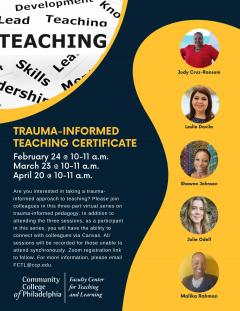Session Descriptions
February 24 from 10-11 a.m.
Becoming trauma-informed means we recognize the impact of adverse childhood experiences and other sorts of trauma in those around us and can adjust our own thinking and behavior so we can prevent further harm. In this presentation, led by Assistant Professor Shawne Johnson and Associate Professor Julie Odell, you will learn about various types of trauma, the effects of trauma on the brain, and how the toxic stress response can affect students’ ability to learn and succeed in reaching their goals. You will also learn about trauma-informed care principles that can help foster resilience and strength.
March 23 from 10-11 a.m.
Please join Assistant Professors Malika Rahman and Judy Cruz-Ransom to gain a better understanding of how trauma impacts learning and behavior. With this approach, we will examine what student behavior may be telling us and reflect on the best teaching practices to support students who may be experiencing trauma. We look forward to sharing our experience.
April 20 from 10-11 a.m.
Trauma-informed pedagogy teaches us that we must keep in mind the prevalence of trauma and how it affects an individual. This impact can extend to educators as well because of the indirect exposure to secondary trauma that is often experienced. Led by adjunct instructor Leslie Davila, this workshop will help participants understand Secondary Traumatic Stress (also known as Vicarious Trauma) and discuss ways to reduce its impact.
For more information on how to sign up for this certificate, please email .

